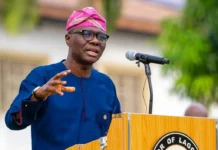 FROM the Federal Government came a revelation yesterday that Nigeria is now classified as a lower middle-income country with total Gross Domestic Product (GDP) of N10 trillion.
FROM the Federal Government came a revelation yesterday that Nigeria is now classified as a lower middle-income country with total Gross Domestic Product (GDP) of N10 trillion.
The classification, which the government admitted has not practically translated into improved standards of living for the citizens, was as a result of the movement of the nation’s income per capita from $1,200 to $1,400.
Minister of State for Finance, Dr. Yerima Lawal Ngama, told journalists at the end of the Federal Executive Council (FEC) meeting yesterday that Nigeria is now the third fastest growing economy in the world with last year’s growth rate of 7.68 per cent.
According to him, Nigeria is queuing behind Mongolia with 14.9 per cent real growth rate and China with 8.4 per cent real GDP growth rate.
At the Council meeting, President Goodluck Jonathan directed all Ministries, Departments and Agencies (MDAs) to begin immediate enforcement of his earlier directive that no product, which could be sourced locally, is imported into the country for the execution of Federal Government projects.
He expressed regret that his earlier directive on local sourcing of goods for all contracts has not been “fully implemented.” Jonathan therefore said for approval to be sought for any product to be imported, there must be evidence that such product cannot be sourced locally.
The Council also ratified President Jonathan’s anticipatory approval of a total of N2.6 billion for the printing of 40 million permanent voters card by the Independent National Electoral Commission (INEC) at the rate of N65 per card, to be issued to each registered card holder in Nigeria. The new card, which is the first phase, will replace temporary voters’ cards issued to 73.5 million voters during the 2011 registration exercise.
Ngama, who briefed journalists alongside with Minister of Information, Mr. Labaran Maku, disclosed that the 7.68 per cent growth came largely from agriculture. But he admitted that the growth rate might not have translated into improved standard of living for Nigerians because of “great income disparity within the country.”
According to the minister of state, “the gap between the poor and the rich in Nigeria might be the longest in Africa. We must ensure inclusive growth, growth that is just and well distributed. But the potential of the Nigerian economy show clearly that this country is still the number one destination for investment. Besides, as we tackle the other challenges delaying our growth, it shows clearly that there is a lot of confidence in the Nigerian economy. We, as a result, will now work harder on our competitiveness.”
He explained that “for the quarter which ended on December 31, 2011, Nigeria was third in terms of GDP growth. We recorded a GDP growth of 7.68 per cent in real terms and this is largely due to growth in the non-oil sector. The previous year, 2010, the GDP growth was 8.4 per cent but last year, it dropped to 7.68 per cent because we had a negative growth in the oil sector. So, it means that the non-oil sector is actually resilient and strong enough to carry the economy forward with or without the oil sector.
“But the more important story out of it is that as a nation, we have our Vision 20-2020, we have the objective of having one of the world strongest economies by the year 20-2020. All the other countries, apart from China, that are ahead of Nigeria are growing at a slower rate than Nigeria. When those ahead of you are growing slower, it means that in the next eight years, we will achieve our objective of being one of the strongest economies in the world. As at last December, our total GDP was more that N10 trillion. And that is a growth that is unprecedented, despite our challenges.”
On using locally-produced products to execute Federal Government contracts, the President asked the Minister of Trade and Investment, Dr. Olusegun Aganga, to list out all items that can be produced within Nigeria.
In March 2011, President Jonathan, through the Federal Executive Council, ordered Ministries, Departments and Agencies (MDAs) to henceforth patronise locally-assembled goods, including vehicles in order to boost their production and increase employment. The directive was part of the government’s plans to promote made-in-Nigeria products.
According to Maku, “the President directed every MDA to list out those items that they will be procuring this year and sort out those that should be sourced in Nigeria. This is to encourage local producers and boost creation of jobs within the economy for the unemployed and school leavers. The President noted in Council today that in spite of this directive, MDAs were yet to fully implement it. So, he asked all MDAs that as we prepare for the 2012 budget year, they should list out in our procurement plans those things that should be procured locally. This is to ensure that we encourage local producers and also encourage domestic economic growth.”
The minister said President Jonathan “also directed the Minister of Trade and Investment to prepare a plan for those items, good and services, that we have the local capacity to produce but which we are lagging behind in their production. This will enable the government, through the economic management team, to sort out those items that we must deliberately set out to encourage local producers to produce within the country.”
On the contract for voters’ cards, Maku added that “next year, INEC is expected to bring another proposal for the production of another batch of voters’ cards to the Council for approval. The electoral process is one of the key programmes of this administration. We saw from the last election that our electoral processes are getting cleaner by the day. Post-election cases were down by more than two-thirds. So, the electoral process will continue to receive the attention of this administration. We urge INEC to ensure that the cards are printed as soon as possible and distributed to voters so that they can be ready for other elections between now and 2015.”




